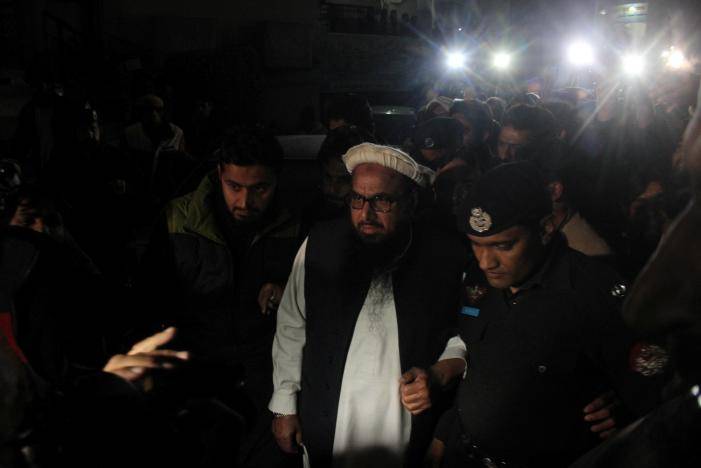Hours after the government detained Hafiz Saeed, the alleged architect of the 2008 Mumbai attacks, New Delhi Tuesday said the Jamaat-ud-Dawa founder had been placed under "preventive detention".
Saeed, pointed to by critics as evidence of Pakistan's reluctance to crack down hard enough on militants, was held late on Monday at the headquarters of his charity before being placed under house arrest at his home in Lahore.
"Exercises such as yesterday's orders against Hafiz Saeed and others have been carried out by Pakistan in the past also," said Indian government spokesperson Vikas Swarup in a tweet.
Our response to the preventive detention of Hafiz Saeed and others in Pakistan pic.twitter.com/hhGJXFfyc1
— Vikas Swarup (@MEAIndia) January 31, 2017
"Only a credible crackdown on the mastermind of the Mumbai terrorist attack and terrorist organisations involved in cross-border terrorism would be proof of Pakistan's sincerity."
New Delhi has been demanding action against Saeed since the Mumbai raid by 10 gunmen, who infiltrated the city by boat and killed 166 people in a rampage that included attacks on two luxury hotels, a Jewish center and a train station.
The attack brought nuclear-armed Pakistan and India closer to war, although Islamabad denied any state involvement.
Saeed was placed under house arrest just after the Mumbai attacks but was released six months later when a court ruled there was insufficient evidence against him.
In recent months, Saeed has been holding regular news conferences to denounce a security crackdown in Indian-held Kashmir.
"If they believe that they can throw the Kashmir issue into the background through our arrests and our confinement, that is not possible," Saeed said as he was being led away by police.
Small protests
Supporters of Hafiz Saeed staged small protests on Tuesday and condemned the United States. About 500 protesters shouted similar slogans outside the provincial assembly in Lahore.
"Release Hafiz Saeed! ... Anyone who is a friend of the US is a traitor!" chanted about 150 members of Saeed's JuD in Karachi.
Demonstrations also were held in Islamabad, according to the JuD, which the United States says is a front for the Lashkar-e-Taiba (LeT) militant group blamed for the Mumbai attack.
Saeed founded LeT in the 1990s but later distanced himself from it.
US pressure, Chinese persuasion
Saeed accused the government of bowing to pressure from Indian Prime Minister Narendra Modi and the United States.
"This is taking place because of Modi's insistence, Trump's pressure and Pakistan's helplessness," Saeed told reporters.
The United States has listed both the LeT and the charity as "foreign terrorist" organisations and has a $10 million reward for information leading to Saeed's arrest.
The Pakistani government has not officially commented on why it acted now.
A senior defence ministry official said the government had not been contacted by the new US administration, but it had been feeling American pressure on the issue.
"Trump is taking hard decisions against Muslim countries, there is open talk of actions against Pakistan also. So yes, this was a consideration," said the official, who declined to be identified.
Several other government officials have said recently that long-time ally China has been working to persuade Pakistan to act against wanted militants such as Saeed.
Officials in Beijing did not respond to queries on Tuesday, which falls during the Lunar New Year holiday.






